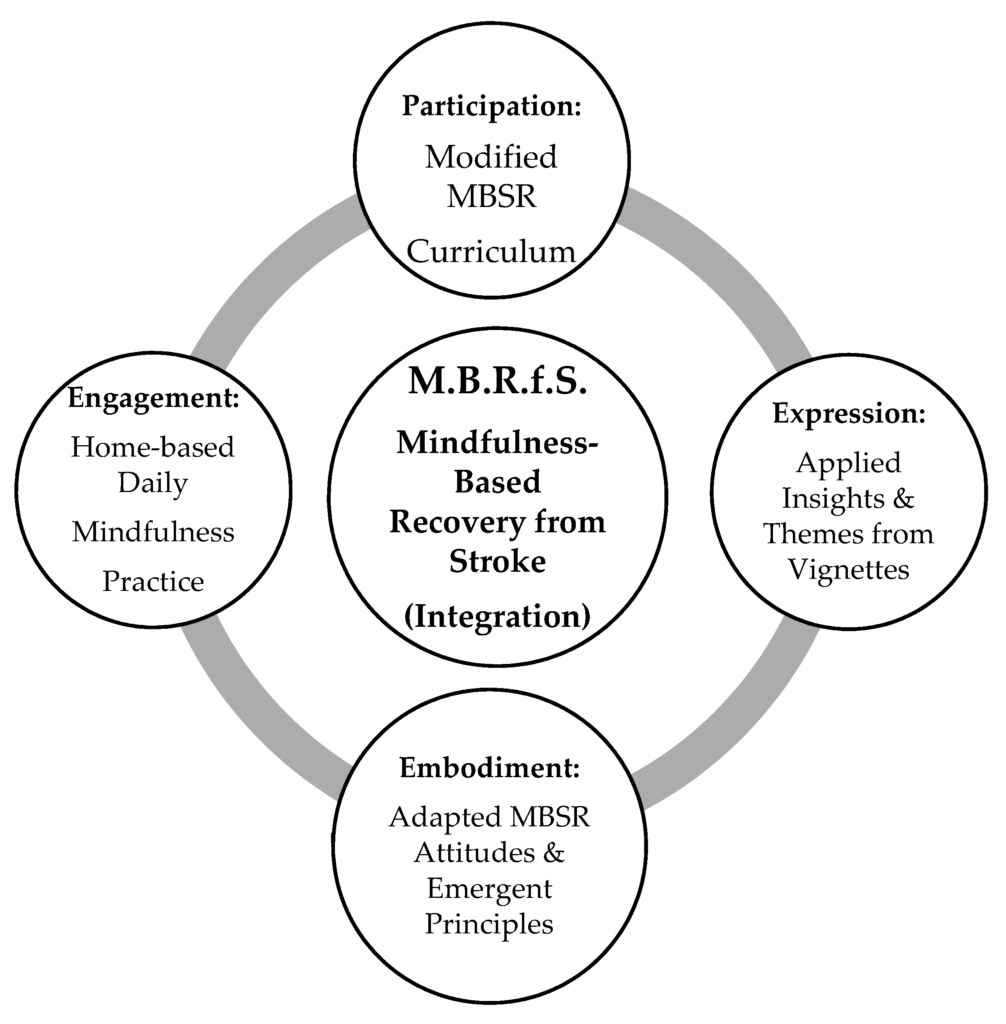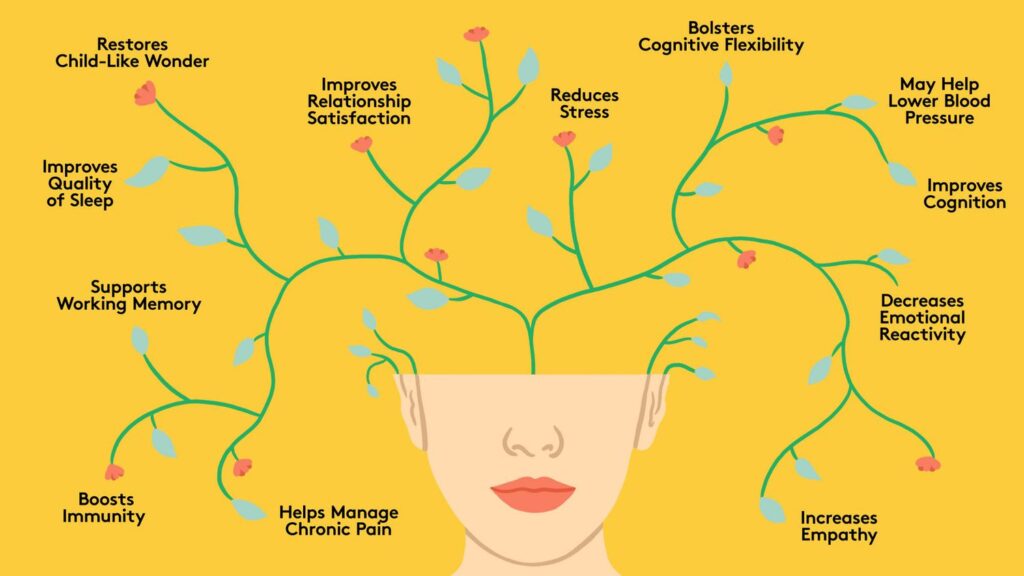A Path To Emotional Well-being

Have you ever struggled with feeling overwhelmed, stressed, or anxious? If so, you’re definitely not alone. Life can be challenging, and it’s easy to get caught up in the chaos and lose sight of our emotional well-being. But what if there was a way to navigate these challenges with more ease and find a sense of peace within ourselves?
That’s where mindfulness-based stress reduction comes in. It’s a practice that has been around for centuries, but has gained popularity in recent years due to its powerful impact on our overall emotional well-being. By incorporating mindfulness into our daily lives, we can learn to observe our thoughts and feelings without judgment, and cultivate a greater sense of self-awareness and acceptance.
In this article, we will explore the concept of mindfulness-based stress reduction in more detail, and learn about the various techniques and strategies that can help us effectively manage stress and cultivate emotional well-being. From breathing exercises to guided meditation, there are countless tools and resources available to support us on this journey. So if you’re ready to embrace a more mindful and balanced way of living, keep reading to discover how mindfulness-based stress reduction can be a path to emotional well-being.

What is Mindfulness-Based Stress Reduction?
The concept of mindfulness
Mindfulness is the practice of bringing one’s attention to the present moment, without judgment. It involves paying deliberate attention to one’s thoughts, feelings, and sensations, and accepting them without getting caught up in them. By practicing mindfulness, individuals can cultivate a deeper awareness and understanding of themselves and their experiences.
The origins of Mindfulness-Based Stress Reduction
Developed by Jon Kabat-Zinn in the 1970s, Mindfulness-Based Stress Reduction (MBSR) is an evidence-based program that integrates mindfulness meditation and other mindfulness practices to help individuals manage stress and enhance well-being. Initially, it was primarily used to support patients with chronic pain, but its effectiveness in reducing stress and promoting emotional well-being has since been recognized in a wide range of populations.
Defining Mindfulness-Based Stress Reduction
Mindfulness-Based Stress Reduction is a structured program that combines meditation, body awareness, and mindful movement to help individuals develop a greater capacity for present-moment awareness. The program typically consists of eight weekly sessions, each lasting two to three hours, and includes guided mindfulness practices, group discussions, and gentle yoga exercises. It aims to equip individuals with the skills and tools necessary to manage stress, reduce emotional reactivity, and cultivate self-compassion.
How does Mindfulness-Based Stress Reduction work?
The principles of Mindfulness-Based Stress Reduction
At the core of Mindfulness-Based Stress Reduction are seven fundamental principles:
- Non-judging: Observing thoughts and experiences without labeling them as positive or negative.
- Patience: Cultivating a sense of acceptance and allowing experiences to unfold at their own pace.
- Beginner’s mind: Approaching each moment with a beginner’s mindset, free from preconceptions and expectations.
- Trust: Developing trust in one’s innate ability to navigate challenges and find inner wisdom.
- Non-striving: Letting go of the need to achieve or attain specific outcomes and embracing the process itself.
- Acceptance: Embracing things as they are, without resistance or judgment.
- Letting go: Releasing attachment to thoughts, feelings, and experiences that no longer serve us.
The role of mindfulness in stress reduction
Mindfulness practice helps individuals develop an awareness of their thoughts, emotions, and physical sensations in the present moment. By paying attention to these experiences without judgment, individuals can start to recognize patterns of stress, anxiety, and reactivity. This increased awareness allows for a more intentional response to stressors, rather than reacting automatically. Over time, mindfulness can help individuals detach from stressful thoughts and emotions, reducing their impact on overall well-being.
The effects of Mindfulness-Based Stress Reduction on emotional well-being
Numerous studies have shown the positive impact of Mindfulness-Based Stress Reduction on emotional well-being. Regular practice has been found to reduce symptoms of anxiety, depression, and stress, and improve overall emotional stability. Furthermore, individuals who engage in mindfulness practice often report increased self-awareness, self-compassion, and resilience in the face of challenging situations.

Benefits of Mindfulness-Based Stress Reduction
Reducing stress levels
One of the primary benefits of Mindfulness-Based Stress Reduction is its effectiveness in reducing stress. By cultivating present-moment awareness and developing a non-judgmental attitude, individuals can better manage and respond to stressors. The practice of mindfulness allows individuals to step out of the cycle of stress and anxiety, promoting a greater sense of calm and well-being.
Improving emotional regulation
Mindfulness-Based Stress Reduction has been shown to enhance individuals’ ability to regulate their emotions. Through regular practice, individuals become more attuned to their emotions, allowing them to recognize and acknowledge their feelings without getting overwhelmed by them. This increased emotional awareness enables individuals to respond to difficult emotions in a healthy and constructive manner, promoting emotional well-being.
Enhancing self-awareness
Mindfulness-Based Stress Reduction fosters a deep sense of self-awareness by encouraging individuals to observe their thoughts, emotions, and physical sensations without judgment. This heightened self-awareness allows individuals to identify patterns, triggers, and habitual reactions, leading to a clearer understanding of themselves. By cultivating self-awareness, individuals can make more conscious choices and take proactive steps towards emotional well-being.
Promoting overall well-being
In addition to reducing stress and improving emotional regulation, Mindfulness-Based Stress Reduction has a positive impact on overall well-being. Regular practice has been linked to increased feelings of happiness, contentment, and satisfaction in life. By developing a deeper connection to the present moment, individuals can experience a greater sense of purpose, meaning, and fulfillment.
The role of meditation in Mindfulness-Based Stress Reduction
Different meditation techniques used in Mindfulness-Based Stress Reduction
Mindfulness-Based Stress Reduction incorporates various meditation techniques to cultivate mindfulness and promote stress reduction. These techniques include:
- Body scan meditation: In this practice, individuals systematically scan their bodies, bringing their attention to each part and observing any sensations without judgment.
- Sitting meditation: This practice involves sitting in a comfortable position and focusing on the breath or other anchor points, such as body sensations or sounds. The goal is to maintain present-moment awareness.
- Loving-kindness meditation: This practice involves cultivating feelings of kindness, compassion, and love towards oneself and others. It is aimed at fostering a sense of connection and empathy.
- Walking meditation: By bringing awareness to the sensations and movements of walking, individuals can practice mindfulness in motion. It provides an opportunity to engage with the present moment in a different way.
The impact of meditation on emotional well-being
Research has shown that regular meditation practice has numerous benefits for emotional well-being. Meditation has been found to reduce symptoms of anxiety and depression, increase positive emotions, and improve overall psychological well-being. Additionally, meditation has been linked to changes in brain activity, with evidence of increased activity in regions associated with emotional regulation and decreased activity in regions associated with stress and reactivity.

The importance of self-compassion in Mindfulness-Based Stress Reduction
Understanding self-compassion
Self-compassion is the practice of treating oneself with kindness, understanding, and acceptance, especially in times of difficulty or failure. It involves acknowledging one’s own suffering and responding with care and compassion, rather than self-criticism or judgment. Self-compassion is a fundamental component of Mindfulness-Based Stress Reduction and plays a vital role in emotional well-being.
The role of self-compassion in emotional well-being
Self-compassion is essential for emotional well-being because it helps individuals navigate challenging emotions and experiences with greater resilience and kindness. By cultivating self-compassion, individuals can meet their own emotional needs, validate their experiences, and develop a sense of inner support and understanding. This practice promotes self-acceptance, reduces self-criticism, and fosters a healthier relationship with oneself.
Mindfulness-Based Stress Reduction and anxiety
The relationship between mindfulness and anxiety
Mindfulness practice has been shown to have a significant impact on reducing anxiety symptoms. By cultivating present-moment awareness and non-judgmental acceptance, individuals can break free from the cycle of anxious thoughts and bodily sensations. Mindfulness helps individuals become more attuned to the present moment, rather than getting caught up in worries about the future or regrets about the past.
How Mindfulness-Based Stress Reduction can alleviate anxiety symptoms
Mindfulness-Based Stress Reduction provides individuals with the tools and techniques to manage anxiety more effectively. By practicing mindfulness, individuals learn to recognize anxious thoughts and bodily sensations without judgment, allowing them to respond to anxiety with greater clarity and calmness. Regular practice also helps individuals develop a sense of emotional balance, reducing the intensity and frequency of anxiety symptoms.
Case studies on the effectiveness of Mindfulness-Based Stress Reduction for anxiety
Multiple case studies have demonstrated the efficacy of Mindfulness-Based Stress Reduction in alleviating anxiety symptoms. These studies have shown significant reductions in anxiety levels, improved emotional regulation, and enhanced overall well-being among participants. Mindfulness-Based Stress Reduction has been found to be particularly effective in managing generalized anxiety disorder, social anxiety disorder, and panic disorder.

Mindfulness-Based Stress Reduction for depression
The connection between mindfulness and depression
Depression is a widespread mental health condition characterized by persistent feelings of sadness, loss of interest, and a range of physical and emotional symptoms. Mindfulness practice has been shown to have a positive impact on depressive symptoms by interrupting negative thought patterns and promoting emotional well-being.
The impact of Mindfulness-Based Stress Reduction on depressive symptoms
Mindfulness-Based Stress Reduction has been found to be effective in reducing depressive symptoms and preventing relapse in individuals with a history of depression. The practice of mindfulness helps individuals recognize negative thought patterns and develop a more compassionate and accepting attitude towards themselves. By cultivating present-moment awareness, individuals can also experience a greater sense of joy, gratitude, and connection to life.
Research findings on the efficacy of Mindfulness-Based Stress Reduction for depression
Numerous research studies have demonstrated the efficacy of Mindfulness-Based Stress Reduction in reducing depressive symptoms. These studies have shown significant improvements in mood, decreased levels of depression, and increased overall well-being among participants. The evidence suggests that Mindfulness-Based Stress Reduction can be a valuable adjunct to traditional treatments for depression.
Mindfulness-Based Stress Reduction in the workplace
Implementing Mindfulness-Based Stress Reduction programs in organizations
Organizations are increasingly recognizing the benefits of implementing mindfulness-based programs, such as Mindfulness-Based Stress Reduction, in the workplace. These programs can be integrated into employee wellness initiatives, offering staff valuable tools for stress management and emotional well-being. Workplace mindfulness programs often involve trained facilitators delivering group sessions, as well as providing resources and support for individuals to practice mindfulness independently.
The benefits of Mindfulness-Based Stress Reduction for employees
Mindfulness-Based Stress Reduction programs in the workplace have been shown to improve employee well-being and enhance job satisfaction. By equipping employees with mindfulness skills, organizations can help reduce workplace stress, increase resilience, and improve overall mental health. Employees who engage in mindfulness practice often report improved focus, productivity, and interpersonal relationships.
Case studies on the effectiveness of Mindfulness-Based Stress Reduction in the workplace
Several case studies have highlighted the positive impact of Mindfulness-Based Stress Reduction in the workplace. These studies have shown reductions in stress levels, improved job satisfaction, and increased employee engagement. Employers have reported decreased absenteeism and turnover rates, as well as improved workplace relationships and communication.

Mindfulness-Based Stress Reduction for children and adolescents
Adapting Mindfulness-Based Stress Reduction for younger populations
Mindfulness-Based Stress Reduction programs have been adapted and tailored for children and adolescents. These programs often include age-appropriate mindfulness practices, such as guided meditations, mindful breathing exercises, and movement activities. By introducing mindfulness to younger populations, children and adolescents can develop skills for emotional regulation, focus, and resilience from an early age.
The advantages of introducing mindfulness to children and adolescents
Introducing mindfulness to children and adolescents has numerous advantages. Research has shown that mindfulness practice can enhance attention and concentration, improve emotional regulation, and reduce symptoms of anxiety and depression. Mindfulness also helps children and adolescents develop empathy, compassion, and emotional intelligence, which are crucial skills for navigating the challenges of adolescence and adulthood.
The impact of Mindfulness-Based Stress Reduction on emotional well-being in youth
Studies have found that Mindfulness-Based Stress Reduction programs for children and adolescents can significantly improve emotional well-being. These programs have been associated with reduced anxiety and depression symptoms, increased resilience, and improved social-emotional functioning. Furthermore, mindfulness practice in youth has been linked to improvements in attention, memory, and academic performance.
Challenges and criticisms of Mindfulness-Based Stress Reduction
Critiques of mindfulness as a solution for stress reduction
While Mindfulness-Based Stress Reduction has gained popularity and recognition, it is not without its critiques. Some argue that mindfulness can be oversimplified and presented as a quick fix for stress and emotional difficulties. Critics also raise concerns about potential cultural appropriation and the commercialization of mindfulness. Additionally, there is ongoing debate about the underlying mechanisms of mindfulness and its long-term effectiveness.
Controversies surrounding Mindfulness-Based Stress Reduction
Mindfulness-Based Stress Reduction has faced controversies regarding its origins and adaptations. There have been debates about the secularization of mindfulness and the potential dilution of its spiritual roots. Furthermore, questions have been raised about the appropriateness of mindfulness for individuals with severe mental health conditions or trauma histories. These controversies highlight the ongoing need for critical inquiry and ethical considerations in the field of mindfulness.
Integrating Mindfulness-Based Stress Reduction into daily life
Practical tips for incorporating mindfulness practices into daily routines
Incorporating mindfulness into daily life does not require a significant time commitment. Here are some practical tips for integrating mindfulness practices into your daily routine:
- Start with short mindfulness exercises: Begin with a few minutes of focused breathing or body scan meditation. As you become comfortable with these practices, gradually increase the duration.
- Make mindfulness a habit: Set aside dedicated time for mindfulness practice each day. Consistency is key to experiencing the benefits of mindfulness.
- Find anchors: Use everyday activities, such as brushing your teeth or washing your hands, as reminders to be present and engage in mindful awareness.
- Practice informal mindfulness: Bring mindfulness to daily activities, such as eating, walking, or engaging in conversations. Be fully present and savor each moment.
- Create a mindful environment: Minimize distractions, such as noise and clutter, to create a peaceful space for mindfulness practice.
Building resilience through regular mindfulness exercises
Regular mindfulness practice builds resilience by cultivating the capacity to stay present and respond skillfully to stress and challenges. By developing a non-judgmental attitude and accepting all experiences, individuals can navigate difficulties with greater ease. Mindfulness also helps build emotional resilience by promoting self-compassion, which allows individuals to bounce back from setbacks and maintain well-being in the face of adversity.
Research and evidence supporting Mindfulness-Based Stress Reduction
Recent studies on the effectiveness of Mindfulness-Based Stress Reduction
A growing body of research supports the effectiveness of Mindfulness-Based Stress Reduction. Recent studies have shown that the program can significantly reduce symptoms of stress, anxiety, and depression. It has also been associated with improvements in physical health outcomes, such as sleep quality, pain management, and immune system functioning. The evidence suggests that Mindfulness-Based Stress Reduction is a valuable intervention for promoting emotional well-being across diverse populations.
Neuroscientific findings on the impact of mindfulness on the brain
Advancements in neuroscientific research have shed light on the impact of mindfulness on the brain. Studies using functional magnetic resonance imaging (fMRI) have shown that mindfulness practice can produce changes in brain structure and function. These changes are observed in areas responsible for emotional regulation, attention, and self-awareness. The findings suggest that regular mindfulness practice can reshape the brain in ways that support emotional well-being and overall cognitive functioning.
The future of Mindfulness-Based Stress Reduction
Emerging trends and developments in Mindfulness-Based Stress Reduction
Mindfulness-Based Stress Reduction continues to evolve, with emerging trends and developments shaping its future. Technology-assisted mindfulness interventions, such as mobile apps and virtual reality platforms, are becoming more common, making mindfulness more accessible to a wider audience. Additionally, mindfulness is being integrated into various fields, including education, healthcare, and leadership development. The future of Mindfulness-Based Stress Reduction holds promise for continued growth and innovation.
The potential for wider implementation of Mindfulness-Based Stress Reduction
As the benefits of mindfulness become more widely recognized, there is a growing potential for the wider implementation of Mindfulness-Based Stress Reduction. More healthcare providers are incorporating mindfulness into their treatment approaches, and workplaces are adopting mindfulness programs as part of employee well-being initiatives. With increased research support and evidence of effectiveness, Mindfulness-Based Stress Reduction has the potential to become a standard intervention for stress reduction and emotional well-being.
Conclusion
Mindfulness-Based Stress Reduction offers a transformative path to emotional well-being. By cultivating present-moment awareness, individuals can reduce stress, improve emotional regulation, and enhance overall well-being. The program’s integration of mindfulness meditation, body awareness, and mindful movement provides individuals with practical tools to manage stress and navigate life’s challenges with greater clarity and resilience. Whether in the workplace, for children and adolescents, or as a tool for managing anxiety and depression, Mindfulness-Based Stress Reduction offers a holistic approach to emotional well-being. Embracing mindfulness as a way of life can unlock a deeper understanding of oneself and the world, paving the way for lasting emotional well-being and fulfillment. So why not embark on the journey of Mindfulness-Based Stress Reduction today and discover the profound benefits it can bring to your life?




Post Comment